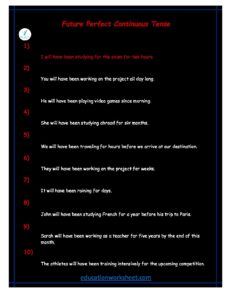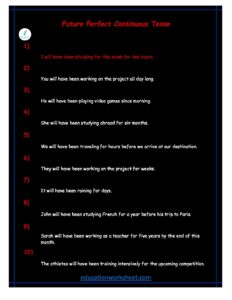how to converting Future Perfect Continuous Tense positive sentences to negative form
how to converting Future Perfect Continuous Tense positive sentences to negative form
Grammar is an essential aspect of language, and understanding how to transform sentences from positive to negative forms is crucial for effective communication. In this comprehensive guide, we will focus on the Future Perfect Continuous Tense and explore the various aspects of converting positive sentences in this tense to their negative counterparts. This guide will provide you with a deep understanding of the rules, usage, and examples to help you master this skill.
What is the Future Perfect Continuous Tense?

The Future Perfect Continuous Tense is a grammatical tense used to describe actions or events that will have been ongoing or in progress at a specific point in the future. This tense is formed by using the future perfect (will have) and the present participle (the base form of the verb + -ing). It is often used to discuss the duration of an action up to a particular moment in the future. The positive form of the Future Perfect Continuous Tense typically follows this structure:
Subject + will have been + verb + -ing + time expression.
For example:
- She will have been studying for two hours by 5 PM.
- They will have been working on the project all night.
Now, let’s dive into the process of converting these positive sentences into negative ones.
Converting Positive Sentences to Negative in Future Perfect Continuous Tense
To convert a positive sentence in the Future Perfect Continuous Tense to a negative one, you need to add the word “not” after the auxiliary verb “will.” The structure of a negative sentence in this tense is as follows:
Subject + will not (won’t) have been + verb + -ing + time expression.
Here are some important points to keep in mind while converting positive sentences to negative ones:
- Use “will not” or its contraction “won’t” to indicate the negative form.
- Place “not” between “will” and “have been.”
- Keep the verb in the base form with -ing.
- Retain the same time expression as in the positive sentence.
Now, let’s break down the process with some examples.
Example Conversions
- Positive: She will have been studying for two hours by 5 PM. Negative: She will not (won’t) have been studying for two hours by 5 PM.
- Positive: They will have been working on the project all night. Negative: They will not (won’t) have been working on the project all night.
- Positive: He will have been playing the guitar for years. Negative: He will not (won’t) have been playing the guitar for years.
- Positive: We will have been traveling since morning. Negative: We will not (won’t) have been traveling since morning.
- Positive: By the time she arrives, I will have been waiting for an hour. Negative: By the time she arrives, I will not (won’t) have been waiting for an hour.
how to converting Future Perfect Continuous Tense positive sentences to negative form

Common Usage and Scenarios
The Future Perfect Continuous Tense is used to describe actions or events that will have been ongoing up to a specific point in the future. Here are some common scenarios where you might need to convert positive sentences to negative ones in this tense:
- Expressing Doubt or Uncertainty: You might use the negative form to express doubt about whether an action will continue up to a certain point in the future. For example, “I doubt they will have been working on the project all night.”
- Making Negative Predictions: You can use the negative form to make predictions about actions that you believe will not continue up to a particular moment. For instance, “She won’t have been studying for two hours by 5 PM because she’s easily distracted.”
- Emphasizing Lack of Progress: When you want to emphasize that an action will not have been in progress, you can use the negative form. For example, “They won’t have been practicing for long, so their performance might not be great.”
- Contradicting Positive Statements: If you want to contradict a previously stated positive statement, you can switch to the negative form. For instance, “I said he will have been jogging for an hour, but he won’t have been.”
- Discussing Unrealized Plans: In cases where an action you expected to occur continuously has not, you can use the negative form. For example, “I thought they would have been celebrating, but they won’t have been.”
In each of these scenarios, understanding how to convert positive sentences to negative ones in the Future Perfect Continuous Tense is essential for conveying your intended meaning accurately.
Challenges and Common Mistakes
While converting positive sentences to negative in the Future Perfect Continuous Tense may seem straightforward, there are some common challenges and mistakes to watch out for:
- Incorrect Placement of “Not”: The most common mistake is placing “not” in the wrong position. Always remember to put “not” between “will” and “have been.”
- Neglecting Contractions: Using contractions like “won’t” is common in informal language, but it’s essential to be consistent with your choice of “will not” or “won’t.”
- Forgetting Time Expressions: Ensure that you maintain the same time expression in the negative sentence as in the positive one.
- Confusing the Base Verb Form: It’s crucial to keep the base form of the verb with -ing (e.g., “studying,” “working,” “playing”) unchanged.
- Mixing Tenses: Avoid mixing different tenses within the same sentence. Stay consistent with your choice of tense.
how to converting Future Perfect Continuous Tense positive sentences to negative form

Practice Exercises
To further solidify your understanding of converting positive sentences in the Future Perfect Continuous Tense to negative ones, try these practice exercises:
- Positive: I will have been gardening for three hours. Negative:
- Positive: They will have been cooking all day. Negative:
- Positive: By the time we reach the summit, we will have been hiking for hours. Negative:
- Positive: He will have been painting the house since morning. Negative:
- Positive: She will have been practicing the piano for months. Negative:
- Positive: I will have been waiting for the bus for an hour. Negative:
- Positive: They will have been studying diligently. Negative:
- Positive: By the time the party starts, he will have been decorating the venue for hours. Negative:
- Positive: We will have been traveling for weeks. Negative:
- Positive: She will have been running the marathon for hours. Negative:
Answers:
- Negative: I will not (won’t) have been gardening for three hours.
- Negative: They will not (won’t) have been cooking all day.
- Negative: By the time we reach the summit, we will not (won’t) have been hiking for hours.
- Negative: He will not (won’t) have been painting the house since morning.
- Negative: She will not (won’t) have been practicing the piano for months.
- Negative: I will not (won’t) have been waiting for the bus for an hour.
- Negative: They will not (won’t) have been studying diligently.
- Negative: By the time the party starts, he will not (won’t) have been decorating the venue for hours.
- Negative: We will not (won’t) have been traveling for weeks.
- Negative: She will not (won’t) have been running the marathon for hours.

